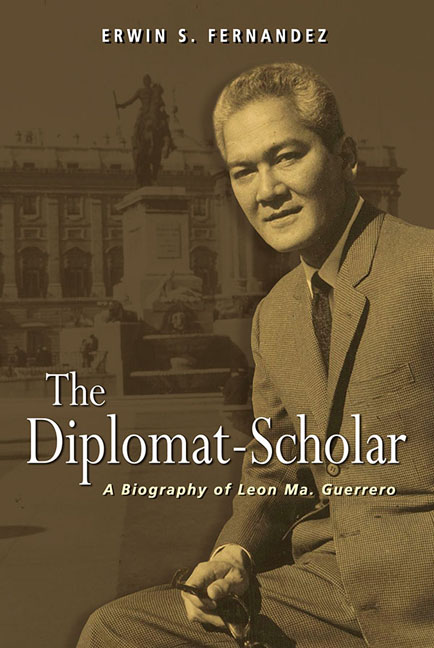Book contents
- Frontmatter
- Dedication
- Contents
- Preface
- Prologue
- Chronology
- I Ermita and Santa Cruz to Intramuros: Between Literary and Legal Career
- II To Tokyo and Back: The Making of a Diplomat
- III Going In, then Out of the Political Jungle: Padre Burgos to Arlegui
- IV London and Madrid: The Philippines in a Resurgent Asia
- V New Delhi to Belgrade: The Philippines towards Non-Alignment
- 18 Homecoming to Asia at Nehruvian India
- 19 “Diplomacy of Development” and Other Speeches
- 20 The Foreign Policy Rescuer and Again, Critic
- 21 The Diplomat as Efficient Intellectual-Bureaucrat
- 22 Endorsing Non-alignment amid Personal Crisis
- 23 Flirting with Dictators
- 24 Martial Law Propagandist
- 25 At Tito's Pre-Balkanized Yugoslavia
- Epilogue
- Glossary
- List of Abbreviations
- Bibliography
- Index
- About the Author
22 - Endorsing Non-alignment amid Personal Crisis
from V - New Delhi to Belgrade: The Philippines towards Non-Alignment
Published online by Cambridge University Press: 12 January 2018
- Frontmatter
- Dedication
- Contents
- Preface
- Prologue
- Chronology
- I Ermita and Santa Cruz to Intramuros: Between Literary and Legal Career
- II To Tokyo and Back: The Making of a Diplomat
- III Going In, then Out of the Political Jungle: Padre Burgos to Arlegui
- IV London and Madrid: The Philippines in a Resurgent Asia
- V New Delhi to Belgrade: The Philippines towards Non-Alignment
- 18 Homecoming to Asia at Nehruvian India
- 19 “Diplomacy of Development” and Other Speeches
- 20 The Foreign Policy Rescuer and Again, Critic
- 21 The Diplomat as Efficient Intellectual-Bureaucrat
- 22 Endorsing Non-alignment amid Personal Crisis
- 23 Flirting with Dictators
- 24 Martial Law Propagandist
- 25 At Tito's Pre-Balkanized Yugoslavia
- Epilogue
- Glossary
- List of Abbreviations
- Bibliography
- Index
- About the Author
Summary
Two weeks later in June 1971, Guerrero hurried home to attend to his ailing wife, leaving instructions to the embassy personnel. Asked about his opinion on the opening of relations with Soviet Russia which was being opposed by some members of the Foreign Policy Council members, namely Senate President Gil Puyat, Speaker Cornelio Villareal, former Foreign Affairs Secretary Serrano and former President Garcia, he said: “Let's be candid about it. The Russians want to establish diplomatic ties with us, so we set up pre-conditions and get the best deal from such relations.” The Philippines, he said, belonged to a group of countries still adamant about opening relations with Russia, such as South Korea, South Vietnam and Nationalist China.
Again, before the same group of newsmen, when asked on the Constitutional Convention which would open the following day, he suggested the scrapping of the boundary provision or the first article in the 1935 Constitution, not only because the Philippines was the only country with definite territorial boundary, but the provision also worked against the Philippine claim on Sabah. Regarding the Tolentino Law, which delineated Philippine territorial waters around Sabah, he asked, “How can a law modify a constitution?” According to Guerrero, it would be better to rescind this law and adopt the archipelago theory he recently expounded early this year in Colombo, which would extend territorial waters from twelve to 200 miles (19.31 to 321.88 kilometres) from the outermost island. His suggestion to excise from the first article on the national territory the enumeration of colonial treaties was heeded by the committee responsible for that provision two years later.
While in the Philippines, he delivered a lecture before the first ASEAN seminar on “The Role of Mass Media in the Development of Southeast Asia”. His lecture had no connection with the theme, but it revealed a turning point in the development of his foreign policy thinking. It was in this lecture that he seemed to declare that the economic losses incurred as a result of the military bases’ presence far outweighed the economic benefits that these were supposed to bring, citing prostitution, rampant smuggling, and black-marketeering. His lecture was concerned with which foreign policy — alignment or non-alignment — would help in the development of ASEAN or more specifically, towards the region's industrialization programmes.
- Type
- Chapter
- Information
- The Diplomat-ScholarA Biography of Leon Ma. Guerrero, pp. 263 - 269Publisher: ISEAS–Yusof Ishak InstitutePrint publication year: 2017



